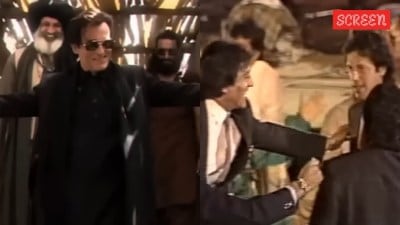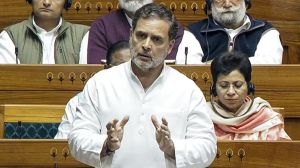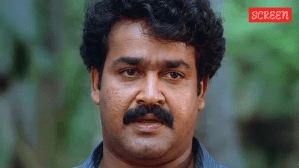Polls ahead, Stalin shifts gears, takes the lead as anti-BJP voice
Before delimitation, has touched on other emotional issues for the South such as language, common NEET, sharing of taxes by Centre
 Stalin has upped the ante on delimitation at a time when his war of words with Union Education Minister Dharmendra Pradhan over the three-language policy under the NEP continues. (Express File)
Stalin has upped the ante on delimitation at a time when his war of words with Union Education Minister Dharmendra Pradhan over the three-language policy under the NEP continues. (Express File) IN his determined campaign to emerge as the voice of the South, and as the face of the opposition to the largely North-centric BJP, DMK chief and Tamil Nadu Chief Minister M K Stalin will count Wednesday as a success.
Stalin, who has been taking on the Centre over its all-India projects such as one NEET for admission to medical colleges and the National Education Policy (NEP), managed to attract parties across the divisive political spectrum in Tamil Nadu to join him in opposing any delimitation based on population.
A delimitation leading to a change in the number of constituencies was last held in 1973. While the next one – over which the South is concerned – is due in 2026, it is unlikely to happen any time soon as the Census exercise that has to precede it is itself delayed.
What will come around earlier are the Tamil Nadu Assembly elections, due next year, and with the opposition AIADMK also on board his anti-delimitation plank, Stalin has clearly changed gears.
At the all-party meeting held at the Secretariat Wednesday and chaired by him, Stalin said that a delimitation based on population would be “a direct attack on Tamil Nadu’s political representation in India’s democracy”. “The knife of constituency delimitation is hanging over South India’s head,” he said, adding that the 1971 Census should be the basis for any delimitation till at least 2056.
Apart from the AIADMK, those present included DMK allies Congress and the Left, and actor-politician Vijay’s newly launched Tamilaga Vettri Kazhagam. Tamil nationalist party Naam Tamilar Katchi and former Union minister G K Vasan’s Tamil Maanila Congress stayed away.
The BJP boycotted the meeting, calling concerns over the delimitation process “imaginary”.
Stalin has upped the ante on delimitation at a time when his war of words with Union Education Minister Dharmendra Pradhan over the three-language policy under the NEP continues.
After Pradhan suggested that Central funds under the Samagra Shiksha scheme, amounting to Rs 2,152 crore, would be withheld unless Tamil Nadu implemented the NEP and adopted the three-language formula, Stalin defined it as an attack on the Tamil language – an issue with much emotional potency in the state.
The DMK government has also been in a near-constant battle of attrition with Governor R N Ravi. When Ravi referred to Tamil Nadu as ‘Tamizhagam’, suggesting that its current name implied it was a separate land (Nadu), Stalin invoked “insult” to Dravidian pride.
The DMK chief has also organised meetings around the theme of ‘Social Justice’ – the party’s original political philosophy – which were attended by CMs of other Opposition-ruled states.
Even via archaeology digs and findings, Stalin has tried to reinforce the Dravidian identity of his party and government, as opposed to the Aryan ideology espoused by BJP co-travellers.
Lately, Stalin has taken on the Centre over its “unfair taxation practices”, getting the support of non-BJP CMs of Karnataka, Kerala and Telangana.
On the delimitation front, after Stalin raised the red flag, Telangana CM Revanth Reddy and Karnataka CM Siddaramaiah raised similar concerns. In September 2024, the LDF government in Kerala led by Pinarayi Vijayan had organised a Conclave of Finance Ministers, where the participants spoke about delimitation harming the interests of southern states.
The logic of these states is that since they have managed to control their population compared to their counterparts in the North, a population-based delimitation exercise may leave them with fewer constituencies. Even if the seat numbers are increased, they will be far behind the surge in the North in a population-based exercise, leaving the South inconsequential – in theory – in who comes to power at the Centre.
Tamil Nadu currently has 39 Lok Sabha constituencies. Stalin reiterated Wednesday that the state could lose eight seats if the total number of parliamentary constituencies remains at 543. If the number of MPs is expanded to 848, a delimitation based solely on population would add 10 seats to its tally, the CM said. However, a formula not based on population could get it an additional 12 seats, Stalin argued.
The unanimous six-point resolution passed at the all-party meeting, while demanding the extension of the 1971-based delimitation framework for another 30 years, said that if the total number of MPs in Parliament is increased, Tamil Nadu receive a proportionate increase in constituencies based on the 1971 population figures.
- 01
- 02
- 03
- 04
- 05































